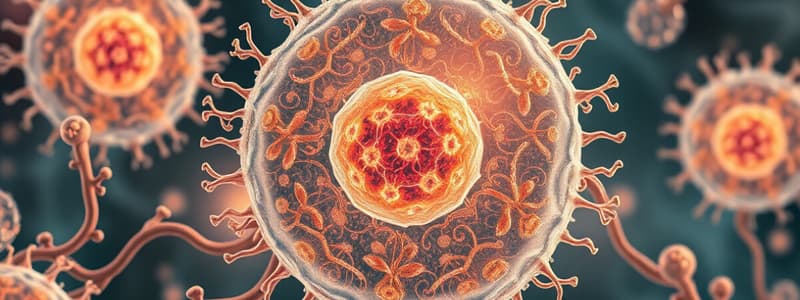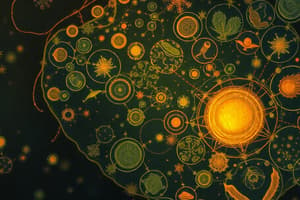Podcast
Questions and Answers
What is the first step in the process of a negative feedback loop?
What is the first step in the process of a negative feedback loop?
What effect do unsaturated fatty acids have on the fluidity of a cell membrane?
What effect do unsaturated fatty acids have on the fluidity of a cell membrane?
What is the primary function of lysosomes compared to proteasomes?
What is the primary function of lysosomes compared to proteasomes?
Is it true that energy is released by ATP from the hydrolysis of the first two phosphate groups?
Is it true that energy is released by ATP from the hydrolysis of the first two phosphate groups?
Signup and view all the answers
Which method is considered the best tool for offsetting forgetting?
Which method is considered the best tool for offsetting forgetting?
Signup and view all the answers
Which mode of cell signaling is primarily seen between nerve cells due to their proximity?
Which mode of cell signaling is primarily seen between nerve cells due to their proximity?
Signup and view all the answers
Which reason(s) make oxygen considered membrane permeable?
Which reason(s) make oxygen considered membrane permeable?
Signup and view all the answers
Which of the following is NOT part of the ribosome complex during protein synthesis?
Which of the following is NOT part of the ribosome complex during protein synthesis?
Signup and view all the answers
Which statement accurately describes gene transcription?
Which statement accurately describes gene transcription?
Signup and view all the answers
Which biomolecule is primarily responsible for long-term energy storage?
Which biomolecule is primarily responsible for long-term energy storage?
Signup and view all the answers
What is the largest component of extracellular fluid?
What is the largest component of extracellular fluid?
Signup and view all the answers
When non-permeable solutes are present in higher concentrations outside the cell, it is referred to as which type of solution?
When non-permeable solutes are present in higher concentrations outside the cell, it is referred to as which type of solution?
Signup and view all the answers
Which of the following is not classified as a major tissue type?
Which of the following is not classified as a major tissue type?
Signup and view all the answers
Which of the following is not a characteristic of life?
Which of the following is not a characteristic of life?
Signup and view all the answers
What does the sodium-potassium pump primarily accomplish?
What does the sodium-potassium pump primarily accomplish?
Signup and view all the answers
In which type of muscle tissue is contraction voluntary?
In which type of muscle tissue is contraction voluntary?
Signup and view all the answers
Which receptor signaling do small hydrophobic molecules, such as hormones, primarily use?
Which receptor signaling do small hydrophobic molecules, such as hormones, primarily use?
Signup and view all the answers
What is a characteristic of the anatomical position?
What is a characteristic of the anatomical position?
Signup and view all the answers
Which pairing of nitrogenous bases is not found in DNA?
Which pairing of nitrogenous bases is not found in DNA?
Signup and view all the answers
Which statement best describes neuroplasticity?
Which statement best describes neuroplasticity?
Signup and view all the answers
What best reflects the order of increasing levels of complexity?
What best reflects the order of increasing levels of complexity?
Signup and view all the answers
How does caffeine affect adenosine levels in the body?
How does caffeine affect adenosine levels in the body?
Signup and view all the answers
Which type of channel proteins can function actively or passively?
Which type of channel proteins can function actively or passively?
Signup and view all the answers
Study Notes
Negative Feedback Loop
- Detection of a change in a critical physiological factor.
- Signal sent to effector cell.
- Effector cell causes change in physiology.
- Change in physiology drives critical physiological factor back to normal levels.
Membrane Fluidity and Fatty Acids
- Unsaturated fatty acids increase the fluidity of the cell membrane.
Lysosome and Proteasome Function
- The lysosome breaks down all four types of biomolecules using enzymes and acid.
ATP Hydrolysis
- Energy is released by ATP from the hydrolysis of the first two phosphate groups. False.
Memory and Forgetting
- Testing yourself is the best tool to offset forgetting.
Cell Signaling
- Paracrine cell signaling is seen between nerve cells.
Membrane Permeability
- Oxygen is membrane-permeable because it's small, hydrophobic, and uncharged.
Ribosome Complex
- Transcription factors are not part of the ribosome complex during protein synthesis.
Sagittal Cut
- A sagittal cut separates the body into right and left halves.
Gene Transcription and Translation
- Gene transcription produces mRNA; gene translation produces proteins.
Energy Storage
- Lipids are responsible for long-term energy storage.
Extracellular Fluid Components
- Interstitial fluid is the largest component of extracellular fluid.
Osmolarity
- When non-permeable solutes are higher outside the cell, it's called hypertonic.
Tissue Types
- Blood is one of the major tissue types.
Body Cavities
- The thoracic cavity contains both the heart and lungs.
Characteristics of Life
- Nucleic acids are not a characteristic of life.
Sodium-Potassium Pump
- The sodium-potassium pump moves 3 K+ and 2 Na+ against their concentration gradients. True.
Anatomical Position
- Anatomical position includes feet parallel, eyes forward, and standing upright.
Voluntary Muscle Contraction
- Skeletal muscle contractions are voluntary.
Hormone Receptor Signaling
- Hormones, which are small hydrophobic molecules, use nuclear receptor signaling.
Pyrimidine Bases
- The pyrimidine family includes thymine, uracil, and cytosine.
Levels of Complexity
- The correct order of increasing complexity is: organelles, cells, tissues, organs, organ systems.
Caffeine and Adenosine
- Caffeine reduces the level of adenosine in the body. False
DNA Base Pairings
- A - U pairing is not seen in DNA.
Positive Feedback Loops
- A change in a critical physiological factor in a positive feedback loop will lead to an increasing change in the factor.
Channel Proteins
- Channel proteins can be either active or passive. False.
Transmembrane Proteins
- Transmembrane proteins span the entire cell membrane.
Facilitated Diffusion vs. Active Transport
- Active transport can move solutes against a concentration gradient. Facilitated diffusion does not require ATP.
Cell Junctions
- Hemidesmosomes are not flexible attachments involving cadherins but provide attachment of epithelial cells to their underlying basement membrane.
Protein Formation
- Amino acids form proteins.
Chaperone Protein Location
- Chaperone proteins are found in the cytoplasm, Golgi apparatus, and endoplasmic reticulum.
Phospholipid Structure
- The head of a phospholipid is hydrophilic, and the tail is hydrophobic. True.
Neuroplasticity
- Neuroplasticity involves strengthening, weakening, and making new neuronal connections.
Studying That Suits You
Use AI to generate personalized quizzes and flashcards to suit your learning preferences.
Description
This quiz covers essential concepts related to cell processes including negative feedback loops, membrane fluidity, lysosome and proteasome functions, and more. Test your knowledge on how cells communicate and maintain homeostasis through various mechanisms. Ideal for biology students looking to reinforce their understanding of cellular functions.




